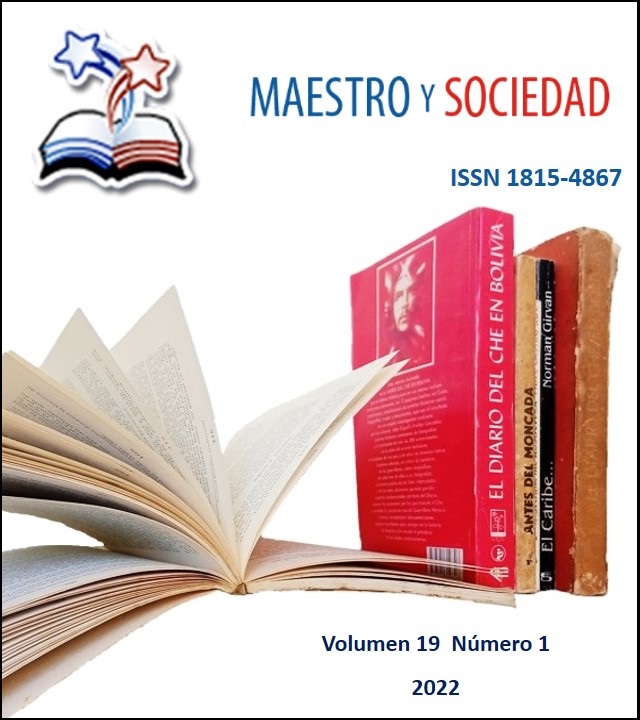Array Array
Array
Palavras-chave:
Array, ArrayResumo
ArrayReferências
2. Black-Hawkins, K. (2017). Understanding inclusive pedagogy: Learning with and from teachers, En V. Plows y B. Whitburn (Eds). Inclusive Education: Making Sense of Everyday Practice (pp. 13-30). Rotterdam: Sense Publishers.
3. Fachal, A., Abásolo, M. J., & Sanz, C. V. (2019). Experiencias en el uso de TIC y rampas digitales en la enseñanza de informática a alumnos de educación terciaria con discapacidad visual o auditiva. In XXV Congreso Argentino de Ciencias de la Computación (CACIC).
4. Gallegos Navas, M. (2018). La inclusión de las TIC en la educación de personas con discapacidad: relatos de experiencias. Editorial Abya-Yala.
5. Graham, L., Berman, J., &Bellert, A. (2015). Sustainable learning: Inclusivepractices for 21st century classrooms. Melbourne: CambridgeUniversity Press.
6. Gómez-Trigueros, I. M., Ruiz-Bañuls, M., & Ortega-Sánchez, D. (2019). Digital literacy of teachers in training: Moving from ICTS (information and communication technologies) to LKTs (learning and knowledge technologies). EducationSciences, 9(4), 274.
7. Gómez-Zepeda, G., Petreñas, C., Sabando, D., &Puigdellívol, I. (2017). The role of the Support and Attention to Diversity Teacher (SADT) from a community-based perspective: Promoting educational success and educational inclusion for all. Teaching and Teacher Education, 64, 127-138.
8. Intxausti, N., Etxeberria, F., &Bartau, I. (2017). Effective and inclusive schools? Attention to diversity in highly effective schools in the Autonomous Region of the Basque Country. International Journal of Inclusive Education, 21(1), 14-30.
9. López, V., Gonzalez, P., Haquin, D. M., Costa, P. A., Sepúlveda, J. C. O., Redón, S. & Salgado, M. (2018). Políticas de inclusión educativa en Chile: Tres nudos críticos. Archivos Analíticos de Políticas Educativas= EducationPolicyAnalysis Archives, 26(1), 157.
10. MINEDUC. (2013). Acuerdo Ministerial Nº 0295-13. https://educacion.gob.ec/wp-content/uploads/downloads/2013/08/ACUERDO_295-13.pdf
11. MINEDUC. (2019). Educación especializada e inclusiva. https://educacion.gob.ec/unidad-de-apoyo-a-la-inclusion-udai/
12. Orozco Almario, I. C. (2019). La pedagogía inclusiva como enfoque emergente en las escuelas: Habla el profesorado de educación primaria. In III Congresso Internacional Envolvimento dos Alunos na Escola: Perspetivas da Psicologia e Educação, pp. 60-68. Instituto de Educação da Universidade de Lisboa.
13. Pavo, M. Á. H., & Patiño, M. G. C. (2020). Aportes de las reformas curriculares a la educación obligatoria en el Ecuador. Revista Scientific, 5(15), 362-383.
14. Rojas-Avilés, H., Sandoval-Guerrero, L., & Borja-Ramos, O. (2020). Percepciones a una educación inclusiva en el Ecuador. Cátedra, 3(1), 75-93.
15. Tedesco, J.C. (2011). Los desafíos de la educación básica en el siglo XXI. Revista Iberoamericana de Educación, 55, pp. 31-47. https://rieoei.org/historico/documentos/rie55a01.pdf
16. Westwood, P. (2018). Inclusive and adaptive teaching: Meeting the challenge of diversity in the classroom. Routledge.
Publicado
Como Citar
Edição
Seção
Licença
Esta revista proporciona un acceso abierto inmediato a su contenido, basado en el principio de que ofrecer al público un acceso libre a las investigaciones ayuda a un mayor intercambio global de conocimiento. Cada autor es responsable del contenido de cada uno de sus artículos. Los artículos pueden ser inéditos o estar disponibles previamente en servidores de preprints reconocidos por la revista. Sin embargo, no se permite la duplicación de la publicación o traducción de un artículo ya publicado en otra revista o como capítulo de un libro.
This journal provides immediate open access to its content, based on the principle that providing the public with free access to research supports a greater global exchange of knowledge. Each author is responsible for the content of each of their articles. Articles may be previously unpublished or available on preprint servers recognized by the journal. However, duplication of publication or translation of an article already published in another journal or as a book chapter is not permitted.
Esta revista oferece acesso aberto imediato ao seu conteúdo, com base no princípio de que oferecer ao público acesso gratuito à pesquisa contribui para um maior intercâmbio global de conhecimento. Cada autor é responsável pelo conteúdo de cada um de seus artigos. Os artigos poderão ser inéditos ou estar previamente disponíveis em servidores de preprints reconhecidos pela revista. No entanto, não é permitida a duplicação de publicação ou tradução de artigo já publicado em outro periódico ou como capítulo de livro.



























 Universidad de Oriente
Universidad de Oriente 